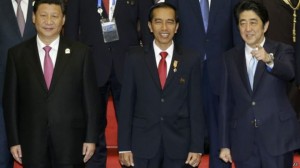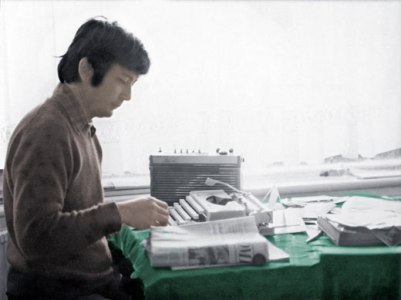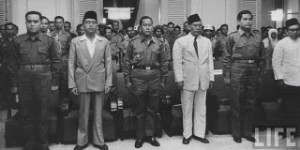When Chinese President Xi Jinping and Japanese Prime Minister Shinzo Abe meet in Jakarta and Bandung this week, the shadow of the China-Japan rivalry will be marked by historical as well as contemporary issues. These define the changing circumstances that will influence Indonesia’s current priorities in its foreign policy initiatives toward Asia’s two giants.

Xi carries the mantle of Zhou Enlai, China’s charismatic premier who wowed the Bandung and Jakarta crowds back in 1955 by solidly backing Indonesian president Sukarno in supporting Indonesia’s nascent anti-colonial stance, whilst at the same time seeking to maintain Sukarno’s attempts to accommodate Japan’s rise to recovery and its future role in an increasingly post-colonial Southeast Asia.
At the same time, Xi carries the burden of managing China’s increasingly complicated internal situation, most importantly curbing corruption within its rampantly uncontrollable bureaucracies in China’s diverse provinces.
Abe seeks to maintain Japan’s reliance on the protection of the U.S. Pacific Command while at the same time pursuing a more Asia-centric foreign policy to accommodate Japanese public opinion, which seeks a more independent role to play in East Asia and the Pacific.
Both leaders implicitly accept the fact that in the foreseeable future there is no real alternative to the future of China’s and Japan’s economic and exports future other than to rely on the American naval dominance over the sea lines of communication that link the export and import hubs of China and Japan’s vital communications straddling East Asia, the Indian and Pacific oceans and points beyond.
Indonesian foreign policy will have to deftly navigate and at the same time accommodate Xi’s desire to harmonize internal political and economic priorities at home with its assertive role in the East Asia region without threatening the current balance of forces in the Western Pacific.
Abe’s role is no less difficult. He must assure the Chinese government that Japan’s own version of a “peaceful rise” will not bring fears of a Japanese revival of the East Asia Co-Prosperity Sphere of the early 1940s, which led to the Pacific War with the United States and its allies.
President Joko “Jokowi” Widodo’s role as an honest broker will be tested in the immediate aftermath of this week’s meeting to commemorate the 60th anniversary of the Asian-African Conference in Bandung. His promise is to exercise foreign policy that is firm, focused and down to earth. Like Xi and Abe, Jokowi will ultimately be defined by his domestic performance at home.
While Xi is under pressure at home to be more assertive against Japanese revanchism and Abe is under pressure from Japanese nationalists who want their country to curb perceived unilateralism, Jokowi is under pressure from the ultras within his Indonesian Democratic Party of Struggle (PDI-P) who want him to be more assertive, injecting Sukarno-style populism into Indonesian economic and financial policy making.
For Jokowi the AAC commemorative summit comes on the heels of his trip to Tokyo and Beijing to forge Jakarta’s ties with its long-time Asian trading partners.
The time is opportune for Jokowi to raise questions about the Asia Infrastructure Investment Bank, which China has initiated and which has won global support. Jokowi can ask his Chinese counterpart, among others, whether the AIIB is feasible in terms of implementing a “clean, green and transparent” organization to include founding member status.
While major economies like the U.K., Germany and France have agreed to join the AIIB, Japan, which dominates the Asian Development Bank (as well as the U.S., which controls the World Bank) has expressed its wariness toward the AIIB.
Jokowi may also ask Abe to follow up on Japan’s commitment to assisting non-Java provinces to rebalance the Indonesian economy in favor of eastern Indonesia and rescue Indonesia from inequality and disintegration.
As for domestic pressures, they have much in common; Jokowi can persuade Xi and Abe that their performances at home need patience to adjust to current and immediate needs and expediencies.
Jokowi can remind Xi and Abe of the Asian adage on which all great Asian civilizations can rely; time will be on their side.
Those who try to hurry up history may find themselves trapped in the ancient tale of the hare who tried to outrun the turtle.


